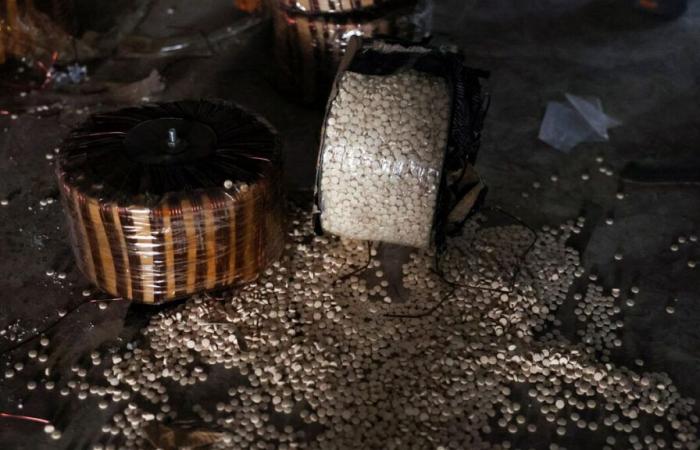This is the toxic legacy of Bashar al-Assad. The collapse of the Syrian regime has released millions of captagon pills into the wild. Every day, rebels discover in ruined hangars or military bases small beige pills of a drug that has transformed Syria into a narco-state. “He had sowed sectarianism and captagonism,” said Abu Al-Joulani, leader of the rebels, in Damascus on Sunday, referring to the reign of the deposed dictator. Where does this drug come from? What is its role in the Syrian economy? Will the traffic continue? Le Parisien takes stock.
A popular drug in the Gulf countries
Captagon was originally a psychotropic drug marketed in the 1960s to treat attention deficit disorder and narcolepsy. One of its main active ingredients, fenetylline, is a synthetic drug from the amphetamine family. Its listing in 1986 by the United Nations as a “dangerous substance” led to the cessation of production of the drug. But since its ban, an underground trade has set up, with fake captagon tablets in circulation.
These pills have become very popular in Gulf countries, especially Saudi Arabia. Easy to manufacture, inexpensive… the consumption of these fake pills with an ultra-stimulating effect quickly spread. In France, this synthetic drug was especially publicized after the attacks of November 13, 2015. The Bataclan terrorists were suspected of having acted under its disinhibiting influence. However, autopsies on the bodies of the terrorists did not reveal any trace of this drug.
A financial windfall for the Assad regime
The manufacture of this synthetic pill exploded in Syria, after the outbreak of the civil war in 2011. Under sanctions, the country saw its legal economy reduced to nothing. The production and trafficking of captagon then became an essential source of income, even for the poorest regions of the country. This system “especially benefited the repressive apparatus of the Assads, the brother of Bashar al-Assad at the head of the 4th military division, Maher al-Assad” who directed most of the traffic, reports Wassim Nasr, journalist and specialist in jihadist movements. from France Culture.
The soldier would be one of the heads of the Syrian captagon network, an industry estimated at at least 10 billion dollars. These drugs had become, by far, Syria's leading export product under Bashar al-Assad.
In addition to a lucrative financial windfall, captagon also provided a lever of diplomatic pressure for the president, since amphetamine has spread in the countries of the region. In Saudi Arabia, the pill is popular at the parties of the wealthy elite but also among modest workers looking for incentives to keep up with the infernal pace of their employers.
And now ? Abou Al-Joulani, who intends to manage post-Assad Syria, has promised to stop the production and trafficking of captagon. A challenge in a country with industry on its knees. “Al-Joulani wants to show the countries of the region that he will fight this trafficking to get aid, and show another face of Syria. This will not be an easy task because the entire state apparatus is involved. And those who make a living from this trafficking will try to continue to make a living from it,” judges Wassim Nasr.






